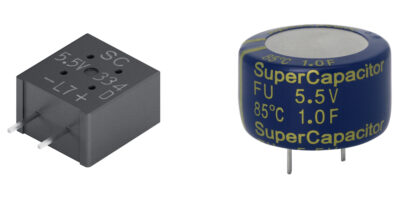Supercapacitors from Kemet are for automotive use
Miniature supercapacitors from Kemet, part of the Yageo Group, can be used for energy storage in automotive electronic applications. The FMD and FU0H series deliver 1,000 hours at 85 degrees C / 85 per cent RH-rated voltage and operational temperature ranging from -40 to +85 degrees C.
The FMD series boasts a lifetime of up to 4,000 hours. The supercapacitors are qualified to an automotive testing protocol and are manufactured in an ISO TS 16949 -certified plant and are subjected to PPAP/PSW and change control.
The FMD and FU0H supercapacitors are suitable for automotive applications needing a main power system backup during a power loss, such as advanced driver assistance systems (ADAS), autonomous vehicles and central gateway engine control units (ECUs). Supercapacitors maintain the main power system’s real time clock or volatile memory when it is removed, for example during a power failure or when the main power system’s battery has been removed for replacement. The FMD and FU0H supercapacitors additionally offer power back up in equipment ranging from IoT devices, smart meters, medical devices, and industrial computing.
The supercapacitor’s benign open-circuit failure mode contrasts with typical short-circuit battery failures that may result in outgassing or ignition. They are also a cost-effective alternative to small back up batteries. Depending on the type of load and current demand, they can store enough energy to provide back up from a few seconds to several hours.
Kemet’s miniature supercapacitors use a proprietary aqueous electrolyte that is claimed to provide high durability against liquid leakage, vibrations, and thermal shock and are therefore reliable in harsh environments. Aqueous electrolytes are highly conductive, have a low environmental impact, and are non-toxic and non-flammable. The supercapacitor’s low internal resistance means that they can fully charge within a few seconds, offering an advantage over a secondary battery cell which can take from 10 minutes to several hours to fully charge. There is no theoretical limit to the life cycle, whereas a lithium-ion secondary cell has a finite lifetime of about 500 cycles. They also typically have a greater resistance to moisture absorption than organic compounds, resulting in a longer life with better stability, reported Kemet.




